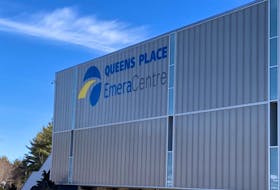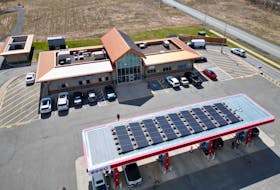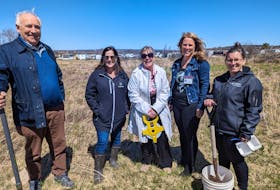
BIBLE HILL - An experimental agri-food company that took root at the Perennia Innovation Centre is getting set to branch off into full-scale commercialization.
"We are in the later stages of commercializing our large-scale food," said Gregg Curwin, CEO of TruLeaf Sustainable Agriculture Ltd., a research and development company dealing with lettuce, herbs and other leafy greens that set up shop at the Bible Hill facility two years ago.
"Our model of food farm production is really about moving it to urban centres and distributing it throughout there, as opposed to central distribution," Curwin said, of the company's plans to establish a large-scale grow-op and packaging centre in Halifax.
But that does not mean it is pulling up stakes at Perennia.
"We're not moving," he said. "We're first and foremost staying in Truro, from an R&D perspective."
What is different about TruLeaf, as opposed to conventional farming methods, is that its produce is grown in multi-level racks of hydroponic containers under a specially designed lighting system.
The crops are grown in a tightly controlled environment - eliminating the need for pesticides - and tended to by people wearing lab coats and nylon gloves.
"We're focused on the baby greens and the micro greens where you can be better suited for cycles and stackability and get the product out the door," he said.
The idea is to be able to generate large-scale, year-round, indoor growth to provide fresh produce, instead of solely relying on products from other countries.
"To be able to grow large-scale amounts of healthy, pesticide-free, nutrient-rich leafy greens and get it so that you consume it within 24 to 48 hours of cutting and cropping, then you get the maximum taste and flavor and nutrients, as opposed to 95 per cent of all of our leafy greens in Canada coming from southwestern U.S."
Curwin said he is in the final stages of choosing a 70,000 square-foot location in the Halifax area to set up the first growing and packing operation of Goodleaf Community Farms, a subsidiary of TruLeaf that has been created to grow lettuce and herbs for the supermarket, restaurant and food service industries.
And the long-term plan is to establish other growth centres in places like St. John's, N.L., Toronto and even in the far north, where fresh produce is not available.
"It's a serious issue up there," he said, of places such as such as Nunavut and Iqaluit. "It's a big, big problem. The quality is not good and the pricing is crazy and it's really not nutritious food even though they're calling it vegetables. If you have been on the road for two weeks trying to get up to the Arctic, there's not much left of you."
Establishing his leading-edge growth centres in such isolated places where employment opportunities are scarce, also offers the potential for economic development, Curwin said, providing it can be deemed to be "a viable business."
"Our design goal all along, that we talk about internally, is that we could put food production anywhere on the planet. It's a bit of stretch. Not so much in Truro in Halifax but as we're learning, not so much in Iqaluit, not so much in Barbadosm but what does it look like perhaps for disaster relief," he said.
"You know, imagine if you had a system where you could drop it in the middle of three million refugees from Syria. And we have an idea on that, but that's down the road."
But TruLeaf would not be where it is today, he said, without the type of facility, expertise and connectivity to experts in other countries that is offered by Perennia and its connection to Dalhousie University's Agricultural Campus.
"There was a reason why I wanted to come to Truro and not stay in Halifax, I'll put it that way," he said, describing Perennia and all it has to offer as being "vital" to his company's progress.
"I don't think we would be as far along as we are without this facility, the connectivity and without Truro."
Twitter: @tdnharry








